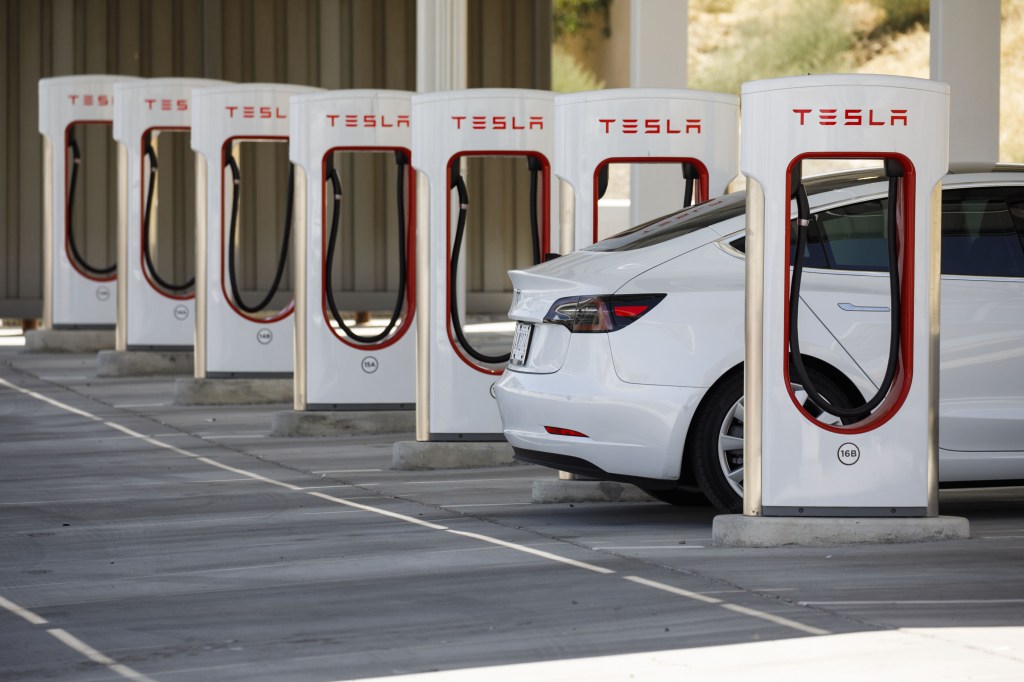After a decade of keeping its North American charging network closed to outsiders, Tesla appears poised to allow other electric vehicles to use its Superchargers.
The White House announced on Wednesday that the company would open 7,500 chargers — including 3,500 250 kW stalls along highways — to any EV with the combined charging system (CCS), the standard broadly used in the U.S. (The company has vowed to do something similar before, so maybe don’t hold your breath just yet, though this new Biden administration fact sheet has some hard numbers, which were notably absent last year.) The first bricks in the EV charger wall should rattle loose by the end of 2024.
If Tesla follows through — again, a big “if” given the company’s preference for splashy announcements and optimistic timelines — it could usher in a sea change in EV charging infrastructure in the U.S.
Today, Electrify America, the closest competitor, has about 3,500 fast chargers. If Tesla were to make the change overnight, it would double the number of fast-charging stalls.
Tesla’s main motivator, of course, is getting a piece of the $7.5 billion EV charging pie that’s part of the Bipartisan Infrastructure Law. While opening a portion of the Supercharger network will help the automaker’s bottom line courtesy of the government, the move will also have some knock-on effects that are likely to upend EV charging in the U.S. Here are a few ways those could unfurl.
The cynical take is that Tesla is simply going to use federal money to put even more distance between itself and its competitors. It’s possible, even likely, that the company will use the new funding to add new stalls to its already enviable network.
Today, Tesla has about 14,000 Supercharger stalls in the U.S., according to the Department of Energy, more than four times those of Electrify America. The White House announcement mentioned that Tesla would “more than double its full nationwide network” as part of its commitment to gain access to federal funds, which would put it even further ahead. Why not have the federal government help foot the bill for 25% of those expansion plans? From a practical perspective, it makes sense to use it to add rather than retrofit since existing Superchargers won’t work with other EVs without an adapter.
An optimistic take is that Tesla might have plans to make a business out of the Supercharger network. It’s been argued before: Goldman Sachs has said the company could add $1 billion to $3 billion in annual revenue by doing so. For a company with $80 billion or so in revenue, that’s not a big number, but it’s enough to be tempting. Superchargers help sell Teslas, but they’re not cheap to build and maintain. With many chargers being used far less frequently than their capacity allows, why not fill the gap?
Yet Tesla isn’t opening the network entirely, suggesting that the company isn’t certain the business model will be profitable. There are plenty of variables the company has to consider, from pricing to utilization rates, locations and even how such a change will affect existing customers. By opening only a subset of the network, Tesla is testing the waters. If all goes well, expect to see more chargers open up. If not, 3,500 might be the limit.
Another reason to be skeptical: EV charging networks are not easy to build or maintain. They were hard enough to manage when the service ran through slower Level 2 equipment; it’s even harder now with DC Fast equipment, which is an order of magnitude or two more expensive and complex. Just ask industry old-timer ChargePoint how it’s going. Founded in 2007, the company was among the first out of the gate with a Level 2 network, and in recent years it has been building its DC Fast capacity. Yet despite having a head start on just about everybody, it has struggled to reach profitability.
Part of those troubles might boil down to the industry-favored business model, which largely depends on usage fees charged to drivers. The fee-for-electrons model hasn’t proven to be very lucrative, and as a result, non-Tesla EV charging pretty much sucks.
Tesla’s entry into that sucky market could go one of two ways. Today, the company can afford to have a trim profit target because the Supercharger network helps move metal. But if the market balks at the higher prices needed to support its more heavily used chargers, the company might rue the day it decided to accept federal funding. Tesla drivers would grow frustrated, and one of the company’s main selling points would become an albatross. Tesla would become yet another player in an industry locked in a death spiral of low prices and sketchy reliability.
The other possibility is that Tesla, which has shown great aptitude for running a high-quality charging network, shows the EV-driving public how it’s done. The company can charge a premium because people will prefer its network, knowing the chargers will be conveniently located and in good working order. Other companies take notice and invest even more heavily in better sites and higher reliability, eventually earning themselves a premium, too.
At this point, I’d wager that the odds of either outcome are equal. As an EV driver since 2015, I know just how much better charging networks are today. But having road-tripped in both Tesla and non-Tesla EVs, I know just how much further they have to go.































Comment